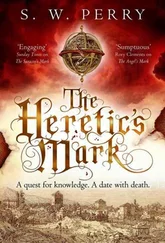As our wagon moved slowly past fields covered in deep drifts of encrusted snow, I looked expectantly about for farmhouses or, better still, the sight of a garrison outpost or a gallows hill with the remains of ropes still dangling from broad-limbed oaks where the hangman had cut down the bodies. We speculated about how long the bodies would be left on the rope before public decency required them to be removed. In years to come children of a tender age would be kept away from the hangings, flailings, and public tortures of the honorable courts of New England. But I was yet in my innocence and thought such necessary instructions to be no more unpleasant than wringing the head from a chicken’s neck. I had, from time to time, seen men and women in the stocks, and it had been great sport for my brothers and me to throw bits of refuse at their captive heads.
Crossing over the Shawshin River bridge, we entered the Boston Way Road, which would lead us north to Andover. We passed the houses of our new neighbors, the Osgoods, the Ballards, and the Chandlers, all to the west of us. And there, just ahead to the east, was the town’s southern garrison. The garrison was a stout two-storied house with provisions and ammunition kept on the second floor. The stockades were of great necessity, as there were still violent Indian raids in the surrounds. Only the year before had there been a deadly raid on Dover. Twenty-three were killed. Twenty-nine children were captured to be kept or traded back to their families. We hailed the guard, but as the windows were frosted, the man posted on the lookout did not see us and so he did not raise his hand to us as we passed by.
Just north of the garrison, set off from the main road, was my grandmother’s house. It was smaller than I had remembered and more homely, with a steeply pitched roof and an iron-cladded door. But when the door opened and Richard came to greet us, I remembered well the old woman who followed him out. It had been two years or more since our last visit. Her bones did not like to travel to Billerica by cart, she had said. And she told my mother she would not imperil her daughter’s immortal soul by having us travel to Andover until my parents had started going to the meetinghouse on each and every Sabbath. We could be captured and killed by Indians on the way, or waylaid by path robbers, or fall into a sinkhole and drown, she had said. And then would our souls be lost forever. The years of separation from Grandmother were testament in equal parts to my mother’s obstinacy and her great dislike for sitting in a pew.
The old lady lifted Hannah at once from my mother and welcomed us into a house warmed by a great fire and the smell of a cooking pot, reminding us that we had eaten only a few hard biscuits at dawn. I walked through the house, sucking my stinging fingers, looking at the things my grandfather had made. He had died some years before I was born and so I had never met him, though I had heard Richard say he was so alike my mother that bringing them together was like throwing oil onto a burning brand. The house had one common room with a hearth, a table hand-rubbed and smelling of beeswax, butter, and ashes, a few rush chairs, and one fine carved sidepiece for storing plates. I ran my fingers lightly over the designs, wondering at the cunning workmanship. Our house in Billerica had only benches and a rude trestle table with no pretty patterns to please the eye or the hand. The Andover house had one small bedchamber off the main room and a stairway that led up to a garret room filled with a lifetime of crates and jars and wooden trunks.
My parents, with Hannah, were given Grandmother’s room and bed, while she took a cot next to the hearth in the common room. Andrew, Tom, and I would sleep in the garret, while Richard would have to make his rest with the ox and the horse in the barn close behind the house. He could stand the cold better than most, and Mother said it was because his inner heat was not diminished by an open mouth and a loose tongue. He was handed most of the blankets, as he would have no way of making a useful fire in the hay. Grandmother found for the rest of us a few old relics of batting for our covers against the freezing air.
The first night, the house was filled with the sounds of the walls settling against the layering snow and the warm animal smells of my brothers. I was used to sleeping in an alcove with Hannah at my chest as a warming stone. I lay on my pallet shivering in the cold, and when I closed my eyes I could yet feel the movement of the wagon. The straw worked its way out of the ticking and pricked the skin on my back, making me restless. There was no candle to light our room, and I could not see where my brothers lay sleeping only a few feet away. At long last a shaft of moonlight worked its way in between the boards at the window, and the long-necked jars made shadows of headless ghost-soldiers on the rough timbers, marching as though in battle with the moon shafts traveling across the walls. I threw off the batting and crawled across the splintered planks, feeling along with my hands until I reached my brothers’ pallet and crawled in close to Tom. I was too old to be sleeping with my brothers and would be punished in the morning if caught, but I pressed myself close to his huddled form and, taking in his good warmth, closed my eyes.
WHEN I WOKE in the morning I was alone, my brothers risen, the objects scattered about the room looking gray and much used. I dressed quickly in the aching cold, my fingers as unbending as sausages. I crept down the stairs and heard the sound of Father’s voice vibrating through the common room. The smell of cooking meat made my belly cramp but I crouched low on the stairs so I could see while not being seen, and listened. I heard him say “… it is a matter of conscience. And let us leave it at that.”
Grandmother paused for a moment and, laying her hand on his shoulder, replied, “Thomas, I know of your differences with the parson. But this is not Billerica. It is Andover. And the Reverend Barnard will not brook absence from prayer. You must go today in good faith to the selectmen, before the Sabbath, and give your oath of fidelity to the town if you are to stay. Tomorrow, on the Sabbath, you must come with me to the meeting house for service. If you do not, you may be turned out. There is much conflict with newcomers laying claim to land. There are jealousies and resentments here enough to fill a well. If you stay long enough, you will see.”
He looked into the fire, struggling to resolve the conflict within — between compliance to the laws of the meetinghouse and the desire to be left entirely to his own devices. I was very young but even I knew he was not greatly liked in Billerica. He was too solitary, too imposing in his unyielding beliefs in what was fair and what was not. And there was always whispered gossip of a past life, supposedly unlawful but never precisely named, that created a space for solitude. Last year Father had been fined 20 pence for arguing with a neighbor over property lines. His size, his great strength, and his reputation caused the neighbor to give way in the dispute, allowing Father to plant the boundary stakes where he wanted them despite the fine.
“Won’t you do this for your wife and children?” she asked gently.
Bowing his head to his breakfast, he said, “For you and for my children I will do as you ask. As for my wife, you must ask her yourself. She has a great dislike for the Minister Barnard and coming from me it would be taken very badly.”
FOR ALL GRANDMOTHER was soft and gentle, she was also persuasive, and like water wearing down rock she worked on Mother until she agreed to attend services on the morrow. Mother said under her breath, “I’d rather eat stones.” But she brought out her good linen collar to be washed nonetheless. Richard and Andrew would leave with Father that very morning for the north end of Andover. They would put their mark on the town register and pledge faith to defend it from all attackers, promising to pay tithes in good time to its ministers. I pinched Andrew’s arm hard and made him swear an oath that he would repeat everything he would see and hear. Tom and I were to be left behind with Mother for the cooking and gathering of firewood. Grandmother said that a respectful visit should also be made to the Reverend Francis Dane, who lived directly across from the meetinghouse. He had been pastor in North Andover for over forty years and was greatly loved. He was to have given way in his ministry years ago to the Reverend Barnard but, like a good shepherd, he sensed there was enough wolf in the younger man to warrant his continued protecting presence. The two men grudgingly shared the pulpit, and their sermonizing, every other week or so. I stood at the door and watched the cart’s progress as far as the bend in the road, until they were swallowed behind mountainous drifts of snow.
Читать дальше












